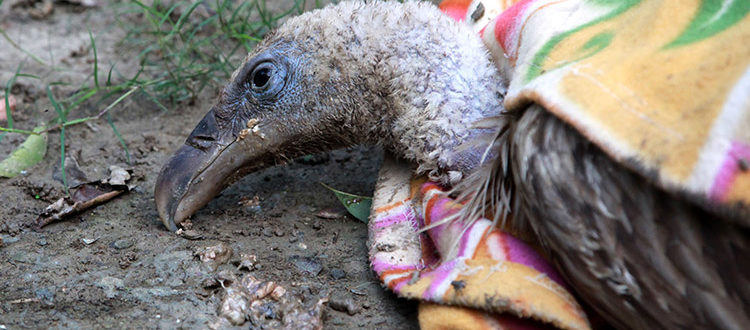Ten Poisoned Himalayan Griffon Vultures Currently Being Treated at CWRC
[acx_slideshow name=”CWRC Poisoned Vultures 28032018″]
The vultures had fed on a poisoned carcass at Laokhowa WLS and are currently convalescing in a special enclosure at CWRC
CWRC, Assam, March 28, 2018: Ten Himalayan Griffon vultures (Gyps himalayensis), found in a comatose condition due to suspected carcass poisoning in Laokhowa Wildlife Sanctuary in Assam’s Nagaon district, were admitted to CWRC (the Centre for Wildlife Rehabilitation and Conservation, IFAW-WTI and the Assam Forest Department’s wildlife rescue, treatment and rehabilitation facility near Kaziranga National Park) on March 25.
Frontline forest staff discovered a number of sick and dead vultures near the Palashtoli anti-poaching camp in Laokhowa Wildlife Sanctuary. Jitendra Kumar, the Divisional Forest Officer, was informed at about 3pm and rushed to the spot. “Seeing the condition of the surviving vultures I immediately contacted CWRC veterinarian Dr Samshul Ali”, he said. “Our frontline staff provided water to the sick birds and the CWRC team reached the spot by 6pm from Kaziranga. The vultures were treated and taken to CWRC for further care.”
IFAW-WTI has attended 225 cases involving vultures (including Himalayan Griffon, slender-billed, white-rumped and cinereous) in Assam over the years, with a rehabilitation rate of over 50 percent.
Fourteen of the 26 vultures found at the site had succumbed to the poison when the CWRC Mobile Veterinary Service (MVS) unit arrived. Dr Ali and the accompanying veterinarian Dr Santosh Kumar Gupta examined and treated the surviving birds before deciding to transport them to CWRC. “This seems to be a case of carcass poisoning”, Dr Ali said. “A dead sheep was found inside the Protected Area and we suspect its carcass was poisoned to kill big cats. Some of the Himalayan Griffon vultures that reside in the area partook of the poisoned carcass and fell sick. Several of them had died and though we were able to treat 12 birds that had survived, two succumbed en route to the centre. The ten birds that were saved are still in a critical state; they have been kept in isolation and are being monitored closely.”
The next morning, Dr Panjit Basumatary, lead veterinarian at CWRC, conducted a health examination and provided additional treatment to two vultures that were once again exhibiting signs of poisoning.
Vultures are often dismissed as lowly scavengers but play a vital role as a natural environmental clean-up crew, preventing the spread of disease to animals and humans. The populations of several species of these ecosystem guardians have plummeted in the last few decades, edging some towards extinction. IFAW-WTI has attended 225 cases involving vultures (including Himalayan Griffon, slender-billed, white-rumped and cinereous) in Assam over the years, with a rehabilitation rate of over 50 percent. Poisoning has been identified as the one of the major known reasons necessitating these interventions.









